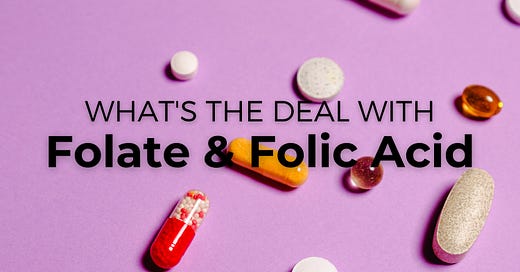Enjoy this post? Support the mission of Baby Dust (and the author’s coffee obsession).
Folic acid and folate are two terms that are frequently used interchangeably, when there is really a big difference between the two supplement forms. In today’s email, we’re diving into the differences, which one you need, and
Baby dust,
Hannah XO
Tip of the Week
Food based folate is found in a lot of different places! Try adding 1 serving to each meal for a boost in overal folate consumption!
Not sure where to start? Dark, leafy greens (i.e. kale, collards, swiss chard, turnip greens) and avocados are both great sources of folate.
Send this newsletter with three friends right now!
Featured Article: “Is Folate the Same As Folic Acid? Which is Better?”
You’ve likely heard of folic acid. Often, this nutrient is talked about as the fertility vitamin for women trying to conceive and, while it is really important, it isn’t simply as straightforward as popping a folic acid pill every day. Unfortunately, there’s a lot of misinformation surrounding this vitamin (B9) because folic acid, the synthetic version, and folate, the natural form, are frequently talked about as though they are one and the same. While both can be protective against neural tube defects, there are structurally different. (Here’s a detailed explanation of the differences.) Additionally, folic acid has a series of drawbacks and does not provide identical benefits as its natural counterpart.
The simplified explanation: Folic acid lacks a “methyl group,” shortcutting certain biochemical processes within the body. Elevated levels of this synthetic vitamin could also pose long-term issues, such as an increased risk of cancer and decreased cognitive function.
Additionally, women with the MTHFR mutation are unable to utilize folic acid. This is especially problematic for fertility, as B9 is extremely important for hormone regulation and fetal development. (This is an easy way to check your MTHFR status.)
Ultimately, we want to be consuming folate from real food sources and in supplements, such as folate, methylfolate, and 5-MTHF. (See the Q&A section below for a methyl-free option.)
Further reading:
If your prenatal contains folic acid throw it away.
Instead, try one of these health coach-approved prenatal multi-vitamins!
needed. Prenatal Multi - A prenatal vitamin powder formulated in conjunction with a panel of doctors, researchers, and experts. [Gluten-free, allergen-free, vegetarian.] Coupon: BLISSBERRYWELLNESS
Seeking Health Prenatal Vitamins - This line of prenatal vitamin and prenatal vitamin protein powders was formulated by a physician who specializes in methylation and nutrigenomics. [Gluten-free, allergen-free, vegetarian.] Coupon: BLISSBERRYAPRIL
Ask Hannah: Your Questions about Folate & Folic Acid Answers
Q. Should I take folic acid along with my prenatal vitamins?
I’d encourage you to make sure that all of your supplements contain folate, as opposed to folic acid. Chris Kresser recommends consuming 800-1200 mcg of folate per day (combined total from real food and supplements) when trying to conceive. His suggestion is to aim for 600-800 mcg of that total to come from supplements. If your prenatal vitamin is not providing folate within that range, you could consider adding in an additional supplement or increasing your consumption of folate-rich foods.
Q. Is there any reason to choose folic acid over folate?
There are two situations I am aware of. First, Chris Masterjohn, Ph.D., advocates for folic acid in treating anemia in certain situations. This is primarily due to the quick absorption of folic acid to rapidly restore red blood cells. Second, some people do not tolerate methylated vitamins very well. In this situation, an unmethylated option is needed to minimize side effects. Dr. Ben Lynch, the foremost expert on methylation, recommends folinic acid for anyone who needs a “methyl-free” prenatal.
Q. How do I find out if I have an MTHFR mutation?
You can easily check your status with an at-home kid, such as the StrateGene DNA Kit. This DNA test will give you information on a variety of genes, in addition to MTHFR, which are important for preconception and fertility.
Other Useful Information
10 Foods To Boost Sperm Health (And Ones to Avoid) - This is the only list you’ll need to identify what is and is not good for sperm health.
Essential Advice for Choosing Dietary Supplements - Unfortunately, it isn’t uncommon for supplements to be contaminated with heavy metals or contain different ingredients than what is indicated on the label. This article shares everything you need to know in order to confidently select quality supplements. (Or you can just visit my shop page for health coach approved options!)
Are 'success rates' a good way to choose a clinic? - An Embryologist offers a candid look at metrics to consider when selecting a fertility clinic. (Spoiler: Success rate is just the tip of the iceberg!)
Coupons
10% off your first needed. order with BLISSBERRYWELLNESS
10% off your first Seeking Health order with BLISSBERRYAPRIL
15% off Legacy at-home sperm testing products with blissberrylegacy
Disclaimer: This email is for educational purposes only and does not constitute medical advice. Please speak to your care provider before making any changes to your diet, lifestyle, or currently prescribed medications. This email contains affiliate links. You will not be charged extra for purchasing through one of our links, but a small portion of the proceeds will go to support Baby Dust.





